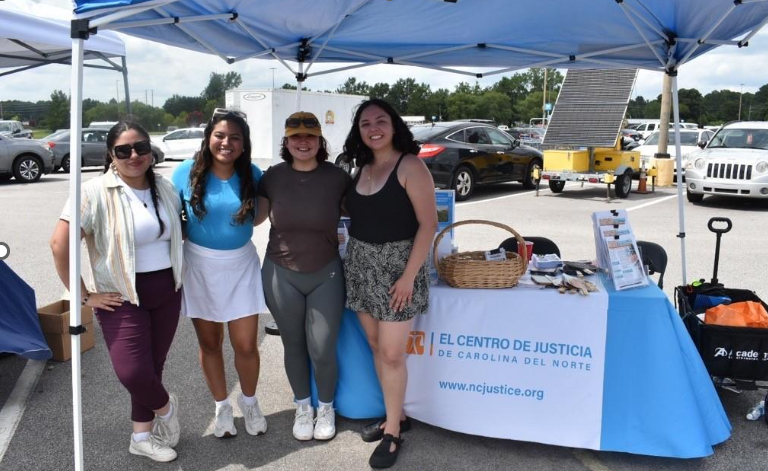
Under the Same Sun: A Sunday with Farmworkers in Wilson, NC
Contact: Andressia Ramirez, Engagement Coordinator, NCJC Worker’s Rights Project
(July 19, 2025—Wilson, NC) By 11 a.m., the Walmart parking lot was already alive. We stepped out of the car to see farmworkers lined up, eager to see what all the commotion was about. Before we could finish setting up, more buses arrived, and the crowd grew. In no time, they weren’t just watching, they were helping us set up, putting up tent poles, sharing laughter, and asking, “¿Y ustedes qué ofrecen?” [And what do you guys offer?]
La cumbia playing in the background drew them in carrying familiar tunes from home, and what is usually a Sunday ritual of racing to buy groceries, cash checks, and send money home suddenly turned into something else: a moment to gather, to talk, and to dream of safer, fairer working conditions.
For as long as I can remember, Sundays in Wilson have meant buses of farmworkers being dropped off at Walmart to do all their compras and errands for the week. Many of them arrived at our tables eager but pressed for time, groups coming and going, torn between meeting basic needs and staying to share their stories.
The rest of the week is a cycle of labor and isolation: long days in the fields, nights in sometimes cramped housing, most units without air conditioning, trying to recover just enough to start again at dawn.
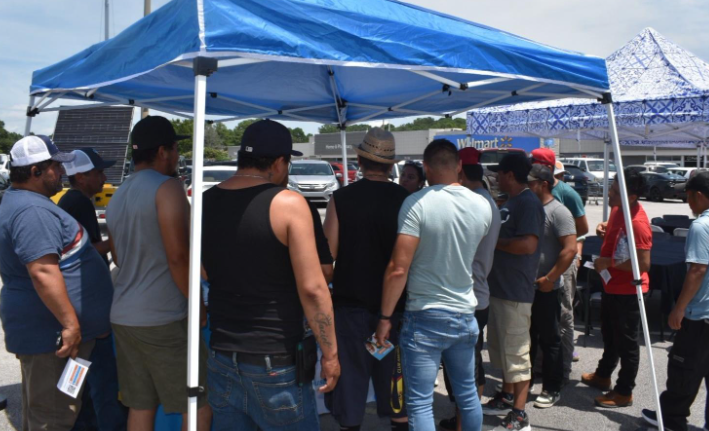
A Community Coming Together
“Bajo el Mismo Sol,” (Under the Same Sun) took place on July 20th in Wilson, NC and was a farmworker appreciation event organized by Casa Azul de Wilson, which brought together organizations with one goal: to stand alongside farmworkers in advocating for their rights. Donations had been collected for weeks leading up to this day to be given directly to farmworkers.
As the Engagement Coordinator of the North Carolina Justice Center’s Workers’ Rights Project, my role was to hear directly from farmworkers on what they need and what they dream of, and to share resources that could help them right now.
From Hesitation to Hope
Most of the farmworkers who joined us that day were H‑2A visa holders. At my table, I offered arm sleeves, gloves, and bandanas and asked them to answer one of these questions:
- How has the heat affected you while working this summer?
- What would you change to make fieldwork more fair?
- What right would you like to have or protect?
At first, many hesitated. Years of being told not to complain had quieted their voices. But I explained how advocacy had already changed things like North Carolina’s Migrant Housing Act, which was amended in 2007 to include the mattress requirement for migrant farmworkers. This amendment stipulates that “each migrant shall be provided with a bed and that shall include a mattress in good repair with a clean cover”.
Once they realized that their input guides the advocacy work we do, ideas started flowing.
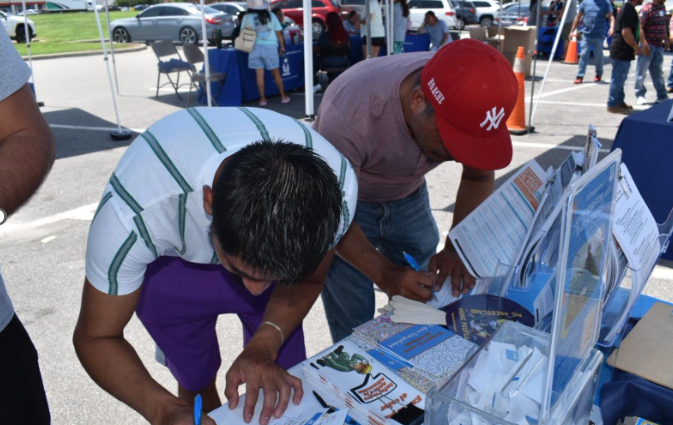
“El calor nos afecta demasiado con sudor vista borrosa mereados temblor en el cuerpo cansancio extremo necesitamo periodos de descanso cuando el calor exceda los 100 en sombra, mejor trato mejores salarios y mas derechos, pensiones principalmente despues de algun tiempo de trabjar con una visa H-2A”
“The heat affects us too much with sweating, blurred vision, dizziness, body tremors, and extreme exhaustion. We need rest periods when the heat exceeds 100 degrees in the shade, better treatment, better wages, and more rights especially pensions after working for some time with an H-2A visa.”
One worker stayed at our table for over thirty minutes, gently encouraging others to write down their thoughts. His own dream was to see a pathway to a permanent legal status after so many years of coming to the U.S. on a temporary H-2A visa.
Another man spoke passionately about the need for cold water in the fields. He even suggested that farms provide ice machines so workers could bring cold drinks with them. He came back multiple times, rallying his coworkers to write down the same request, believing that if enough voices echoed the need, change might follow.
“Lo mas importante es agua fria.”
“The most important thing is cold water.”
Another worker shared something that struck me deeply: she wished for training to learn how to drive tractors. That dream shows that many don’t see farmwork as a temporary job, they see it as a career they want to grow in, if only the system allowed them to learn new skills and move beyond the repetitive, back‑breaking tasks they’ve been assigned year after year.
“Poder tener una escuela para poder aprender cosas nuevas por ejemplo Manejo de tractor, para mejorar el sueldo.”
“To be able to have a school to learn new things, for example, tractor operation, in order to improve our wages.”
There was also the worker who handed me his paper shyly, admitting he couldn’t write. As I helped him, he shared many hopes: medical attention when needed, a shaded place to rest, basic dignity in the middle of a hard day’s work.
An older worker, with 10 years under the sun, spoke of dreaming of a pension, a way out of a life that forces him to return to Mexico each year only to work as a campesino before coming back again, trapped in a cycle with no safety net for the years when his aging body will no longer allow him to work.
“Llevo 10 años viniendo a trabajar de contratado. Lo más dificil es trabajar bajo el sol y regresar 6 meses despues sin tener nada regresar a ser campesino a Mexico solo vuelvo a regresar y seguir en el mismo ciclo. Algo para poder jubilarme y tener una pension.”
“I’ve been coming to work on contract [H-2A visa] for 10 years. The hardest part is working under the sun and returning 6 months later without having anything going back to being a farmworker in Mexico. I just come back again and continue in the same cycle. I want something that allows me to retire and have a pension.”
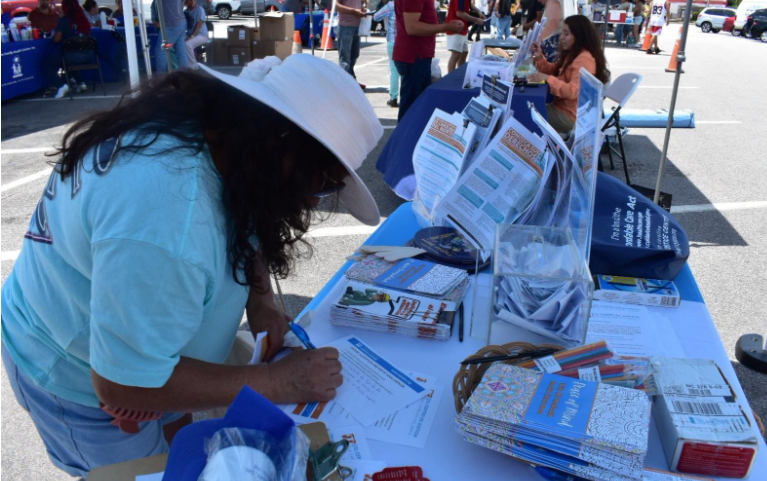
Women workers spoke to us, too, about the need for more than one bathroom, one dedicated for them, closer to their work area, to avoid the long walk to the existing ones or the dangerous alternative of using the woods, where just that week a snake had been spotted. Their stories revealed not only vulnerability to animals and pests but also the risk of harassment.
“Me gustaria que cambien los banos, como por ejemplo que acerquen mas los Banos y que las limpien mas higienes en los Banos porque al no tener los Banos limpios peligramos al ir al baño al bosque por las vívoras venenosas y mas peligros de animales.”
“I would like for the bathrooms to be changed, for example to place them closer and clean them more often better hygiene in the bathrooms because when they are not clean, we take risks when we go to the bathroom into the woods because of the venomous snakes and other dangerous animals.”
As we spoke, we noticed women quietly picking up the Medicaid coloring books on our table. That small act touched us deeply, imagining that this might be one of the few creative outlets available to them during a grueling season. A few workers spoke in dialects unfamiliar to many of us, yet they helped each other translate and answer, grateful for a space where they could finally be heard.
What we heard
By the end of the day, we collected more than 80 responses, some a few words, others full of detail. Themes repeated over and over:
- Safety and workplace protections
- Prevention of heat stress and dehydration
- Access to cold water, ice machines, and shade
- Clean, accessible bathrooms
- Better medical care in the fields
- Breaks without penalties
- Career pathways to support economic growth
- A pathway to permanent status
- Help obtaining driver’s licenses
- Opportunities to learn and advance, like driving tractors
- Pensions and retirement security
- Education for the community about the value of the work they do
The Numbers Behind the Stories
Their stories aren’t just anecdotes; they’re backed by alarming data. U.S. crop workers are 20 times more likely to die from heat-related illness than other civilian workers, according to the Centers for Disease Control and Prevention. These deaths are not random they’re the result of policy gaps and systemic neglect.
Despite being essential to our food system, many farmworkers labor in extreme heat without access to adequate water, shade, rest breaks, or medical care. The WorkRise Network’s 2023 report on extreme heat and work highlights how low wages, immigration status, limited legal protections, and language barriers make agricultural workers especially vulnerable to heat stress.
As extreme heat becomes more common due to climate change, the risks to farmworkers grow. Without national heat standards or stronger enforcement of workplace safety, these preventable tragedies will persist.
Feeling the Heat
That Sunday, the temperature climbed to 93°F under a heat advisory. Even shaded under tents, I felt my skin burning, dizziness creeping in, and that unsettling tingling in my arms, the very symptoms workers described experiencing every day. For me, it was a few hours. For them, it is their reality, season after season.
Why This Matters
I grew up in Wilson, NC, surrounded by the same fields these workers tend. I know the weight of that labor. Coming back now, not as a teenager in the curcos cortando la flor, but as part of an organization fighting for change, I felt a familiar ache, this time not in my back, but in my heart.
This day was about more than handing out gloves or bandanas. It was about listening, truly listening to the people who feed us all who endure conditions most of us cannot imagine, and who deserve dignity and protection.
Calls to Action
- Follow our Facebook page ‘Conozca sus derechos con el Centro de Justicia de Carolina del Norte’ where we share resources for farmworkers and information regarding heat stress and share our content.
- Support organizations like the North Carolina Justice Center and Casa Azul de Wilson
- Join the advocacy for a heat stress law in NC by plugging into Heat Justice Now and the Farmworker Advocacy Network
- Share these stories so others understand the hidden costs of the food we eat.
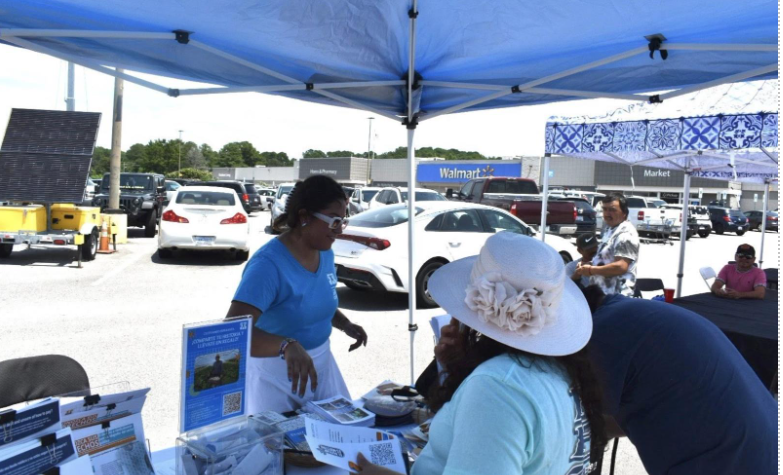
 Justice Circle
Justice Circle 